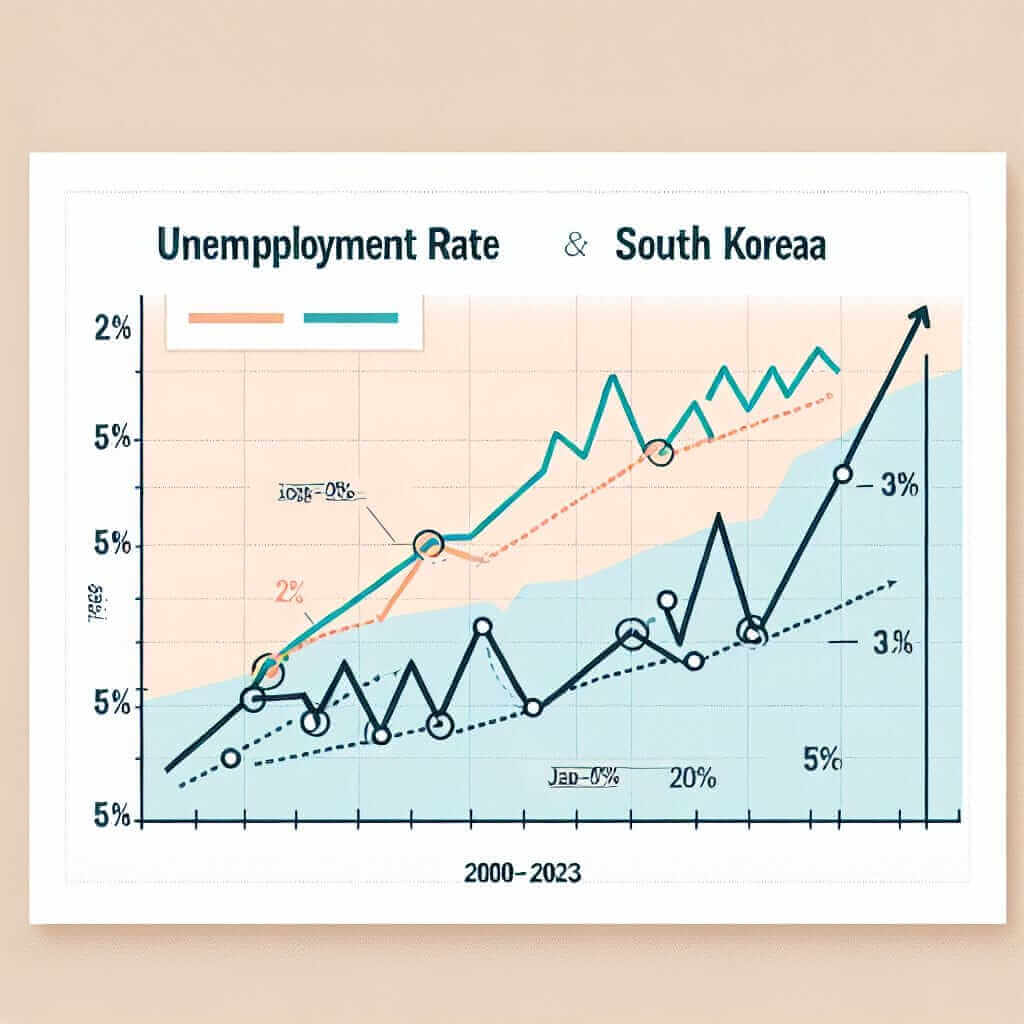The IELTS Writing Task 1 often presents data on global issues, and economic indicators like unemployment rates are popular choices. Specifically, comparing unemployment rates across countries like Japan and South Korea can provide valuable insights into their economic performance and social well-being. This essay will guide you on how to effectively analyze and write about this topic for your IELTS exam.
Potential IELTS Writing Task 1 Questions
Here are some potential IELTS Writing Task 1 questions related to Japan and South Korea’s unemployment rates:
- The line graph below shows the unemployment rates in Japan and South Korea from 2000 to 2023. Summarize the information by selecting and reporting the main features, and make comparisons where relevant.
- The table illustrates the percentage of unemployed individuals in different age groups in Japan and South Korea in 2023. Write a report for a university lecturer describing the information shown below.
- The chart compares the unemployment rate and GDP growth of Japan and South Korea between 2000 and 2020. Summarize the information by selecting and reporting the main features and make comparisons where relevant.
Sample IELTS Writing Task 1 Question and Model Answer
The line graph below shows the unemployment rates in Japan and South Korea from 2000 to 2023. Summarize the information by selecting and reporting the main features, and make comparisons where relevant.

Model Answer:
The line graph provides a comparative overview of the unemployment rates in Japan and South Korea over a 23-year period, from 2000 to 2023.
Overall, both countries experienced fluctuations in their unemployment figures, with South Korea generally exhibiting higher rates than Japan throughout the period. At the start of the millennium, Japan’s unemployment rate hovered around 4%, while South Korea’s was slightly higher at approximately 4.5%. Over the next few years, Japan saw a decrease, reaching its lowest point at around 2.5% in 2007. Conversely, South Korea experienced a significant surge during the same period, peaking at just above 6% before declining to 3% in 2007.
From 2008 onwards, both countries witnessed an upward trend in unemployment, likely influenced by the global financial crisis. However, while Japan’s rate remained relatively stable between 4% and 5%, South Korea’s figures fluctuated more dramatically, reaching a high of 5.5% around 2010 before stabilizing around 4% in the later years.
Word Count: 175 words
Key Points for Writing:
- Paraphrase the question: Don’t simply copy the question wording; rephrase it in your own words for the introduction.
- Overview: Provide a general overview summarizing the main trends in the second paragraph.
- Specific Details: Support your overview with specific data points and comparisons.
- Time Phrases: Use a variety of time phrases to guide the reader (e.g., “at the start of the millennium,” “over the next few years,” “from 2008 onwards”).
- Speculation: It’s acceptable to speculate on reasons behind trends, but avoid definitive statements. Use phrases like “likely influenced by.”
- Concision: Be concise and avoid redundancy. Aim for a word count of 150-190 words.
Useful Vocabulary:
- Fluctuate (verb): /ˈflʌktʃueɪt/ – To rise and fall irregularly in number or amount.
- Surge (noun): /sɜːrdʒ/ – A sudden and great increase.
- Conversely (adverb): /ˈkɒnvɜːsli/ – In an opposite way.
- Trend (noun): /trend/ – A general direction in which something is developing or changing.
- Stabilize (verb): /ˈsteɪbəlaɪz/ – To become fixed or steady and cease to change.
Conclusion
Mastering the IELTS Writing Task 1 requires practice and familiarity with various data types and topics. By understanding how to analyze data related to unemployment rates and using the tips and vocabulary provided, you can confidently approach this type of question in your IELTS exam. Remember to practice summarizing other relevant economic indicators and comparing different countries to broaden your skills further.